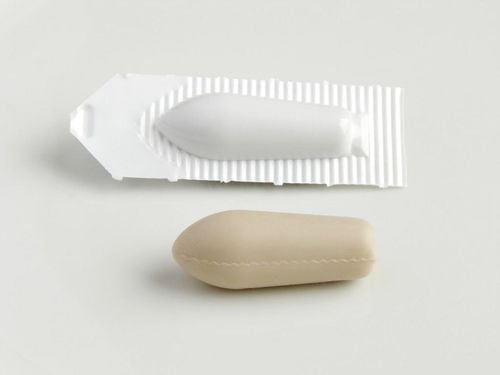Flagyl 250 mg belongs to the group of antibacterial and antiparasitic drugs. It is used in cases of bacterial infections and parasites sensitive to the nitro 5-imidazole group. Depending on the specific condition, the use of the drug varies. Let's explore some characteristics, uses, dosage, side effects, and precautions when using Flagyl 250mg.
1. What is Flagyl 250mg?
Flagyl 250 mg contains the active ingredient metronidazole 250mg. This drug has antibacterial and antiparasitic effects from the nitro-5-imidazole group.
It is effective against:
- HP bacteria (Helicobacter pylori).
- Anaerobic bacteria such as Bacteroides fragilis, Bifidobacterium, Biophilia, Clostridium, Clostridium difficile, Clostridium perfringens, Eubacterium, Fusobacterium, Peptostreptococcus, Prevotella, Porphyromonas, Veillonella.
- Parasites like amoebas, trichomonads, giardia.
After oral administration, the drug is rapidly absorbed through the digestive tract. The plasma concentration is equivalent to the intravenous route at the same dose. The drug is widely distributed in the body, with concentrations nearly equal to those in serum, in the lungs, kidneys, liver, skin, bile, cerebrospinal fluid, saliva, semen, and vaginal secretions. The drug crosses the placenta and is excreted in breast milk. The half-life in plasma is 8 to 10 hours, mainly metabolized in the liver and excreted through the kidneys as metronidazole or its metabolites.

2. Indications and Contraindications of Flagyl 250mg
Flagyl 250mg is indicated for:
- Trichomonas vaginalis infections in the urinary and genital tracts in both men and women.
- Giardia lamblia and amoeba infections.
- Mouth ulcers.
- Prevention of anaerobic bacterial infections.
- Prevention of postoperative infections in gastrointestinal and gynecological surgeries.
Contraindications:
- Patients with a history of hypersensitivity to metronidazole or any excipients in the drug.
- Patients allergic to other nitro 5-imidazole drugs.
- Not for use in the first trimester of pregnancy. Use with caution in the second and third trimesters and during breastfeeding.
3. Dosage of Flagyl 250mg
Dosage varies depending on the disease and age. Here are the specific dosages:
Amoeba infections:
- Adults: 6 tablets of Flagyl 250mg per day, divided into 3 doses.
- Children: 30-40 mg/kg/day, divided into 3 doses.
- For amoebic liver abscess, drainage or aspiration is combined with metronidazole treatment. The usual treatment duration is 7 consecutive days.
Trichomonas infections:
- Women (Trichomonas urethritis and vaginitis): 2 tablets per day, divided into two doses. Both partners must be treated simultaneously, regardless of symptoms. Continuous treatment for 10 days combined with other measures.
- Men (Trichomonas urethritis): 2 tablets per day, divided into two doses for 10 days.
Giardia infections: Treatment duration is 5 consecutive days.
- Adults and children over 15 years: 0.75g to 1g/day, divided into 2 doses.
- Children 6-10 years: 375mg/day, divided into 2 doses.
- Children 10-15 years: 2 tablets/day, divided into 2 doses.
Non-specific vaginitis: 4 tablets per day, divided into two doses, for 7 days. Both partners must be treated simultaneously.
Anaerobic bacterial infections sensitive to metronidazole:
- Adults: 4-6 tablets per day, divided into 2-3 doses.
- Children: 20-30mg/kg/day.
4. Side Effects
Possible side effects include:
- Gastrointestinal: Epigastric pain, nausea, vomiting, diarrhea. Oral mucositis, taste changes, metallic taste, anorexia. Rare cases of pancreatitis, which can be treated. Tongue discoloration.
- Immune system: Rare reactions causing angioedema, anaphylactic shock. Symptoms include abdominal pain, difficulty breathing, rapid heartbeat, hypotension, requiring emergency treatment.
- Nervous system: Neurological disorders such as sensory disturbances, headaches, seizures, dizziness. Some reports of encephalopathy (e.g., confusion), subacute cerebellar syndrome, which can be resolved by discontinuing the drug. Aseptic meningitis.
- Psychiatric: Drug-induced psychiatric symptoms include confusion and hallucinations, depression.
- Vision: Transient visual disturbances, optic neuritis.
- Blood: Rare cases of agranulocytosis, neutropenia, and thrombocytopenia.
- Liver: Some cases of elevated liver enzymes, cholestatic hepatitis, liver cell damage, jaundice. Some cases of liver failure requiring liver transplantation have been reported in patients treated with metronidazole combined with other antibiotics.
- Skin and subcutaneous tissue: Rash, itching, facial redness, urticaria; Stevens-Johnson syndrome.

5. Precautions When Using Flagyl 250mg
To ensure safety, users should:
- Use the drug exactly as prescribed and for the recommended duration. Do not self-increase or decrease the dose or stop the drug when symptoms improve without the doctor's consent.
- If serious side effects occur, stop the drug and inform the nearest medical facility immediately.
- If long-term use of metronidazole is necessary, regular blood tests, especially white blood cell counts, should be performed. Monitor for peripheral or central nervous system reactions such as sensory disturbances, coordination loss, dizziness, seizures.
- Do not drink alcohol during treatment and for at least 24 hours after treatment ends due to the risk of disulfiram-like reactions, including skin flushing, facial redness, vomiting, and rapid heartbeat.
- Use with caution in patients with severe or chronic central or peripheral nervous system diseases due to the risk of worsening neurological symptoms.
Brownish-red urine may appear during treatment but is harmless and will disappear after stopping the drug.
Drug interactions: Some drugs may interact with Flagyl 250mg, increasing toxicity risk, including disulfiram, anticoagulants, lithium, cyclosporine, busulfan.
Caution when operating vehicles or machinery: Due to the risk of confusion, dizziness, hallucinations, seizures, or transient visual disturbances, patients should not drive or operate machinery if these symptoms occur.
Overdose can occur with a single dose of up to 12g: Metronidazole overdose has been reported in suicide attempts or accidental overdoses. Symptoms may include vomiting, coordination loss, disorientation, dry mouth, fainting tendency, skin rash, headache, mild depression, taste disturbances, and nausea. Treatment: There is no specific antidote for this drug. In case of overdose, gastric lavage and symptomatic treatment should be performed.
Pregnancy: Metronidazole crosses the placenta, so it is not recommended for use in the first trimester of pregnancy. In subsequent months, use only when necessary and always weigh the benefits and risks.
Breastfeeding: The drug is excreted in breast milk, causing a bitter taste that makes it difficult for infants to breastfeed. It may also cause adverse effects in newborns and infants. If the mother must use the drug, she should stop breastfeeding for at least 12 hours after taking each dose.
These are the essential details of Flagyl 250mg. Note: This is a prescription drug, so it should be used under the guidance of a doctor and not self-medicated as it can be harmful to the body.
To arrange an appointment, please call … or make your reservation directly HERE. You may also download the MyVinmec app to schedule appointments faster and manage your reservations more conveniently.













